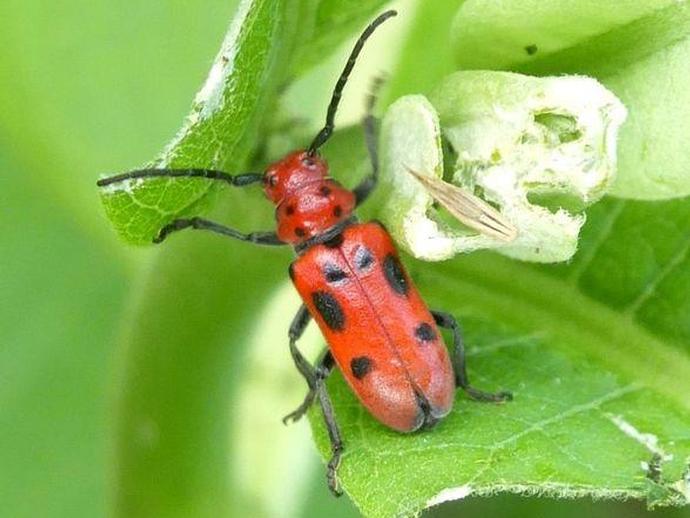July 26, 2021
Ben is taking a well-deserved day off today, so we're reaching into the archives for today's #BenInNature update presented by our friends at Carter Bank & Trust! The following post was originally published on July 16, 2020.
Yesterday we looked at common milkweed (Asclepias syriaca). Today, let's look at a critter that you're likely to find living on milkweed: Tetraopes tetrophthalmus, the red milkweed beetle!
Both the genus name and species name of this beetle mean "four eyes," which comes from an unusual feature of this beetle: their antennae are positioned so far forward on their heads that the base of the antennae bisect the beetle's eyes, giving it the appearance of four eyes!
Just like monarch butterfly caterpillars, red milkweed beetles use the toxic glycosides that are present in their host plant to protect themselves from predators. By eating milkweed, these beetles are able to make themselves taste terrible to predators. These beetles have another unusual defense: when they're startled, they make a shrill squeaking noise. Adorably enough, they're also said to make a purring noise when they're interacting with other milkweed beetles!
If you'd like to hear a purring, squeaking beetle yourself, they're not terribly hard to find right now. Just look for a patch of milkweed and poke around a bit. With their bright aposematic coloration, these beetles are pretty easy to spot!
ABOUT #BenInNature
Social distancing can be difficult, but it presents a great opportunity to become reacquainted with nature. In this series of posts, Administrator of Science Ben Williams ventures outdoors to record a snapshot of the unique sights that can be found in the natural world. New updates are posted Monday - Friday, with previous posts highlighted on the weekends. This series of posts is made possible thanks to the support of VMNH Corporate Partner Carter Bank & Trust (www.cbtcares.com).
NATURE PHOTO IDENTIFICATIONS
If you discover something in nature that you would like help identifying, be sure to message us right here on Facebook with a picture (please include location and date of picture) and we'll have our experts help you identify it!

 Hours & Admissions
Hours & Admissions Directions
Directions

